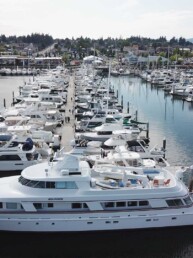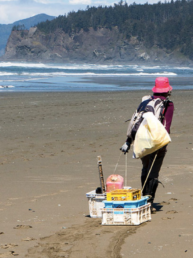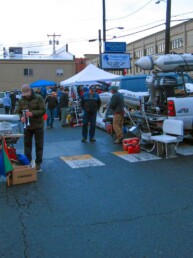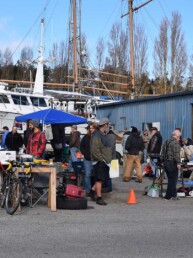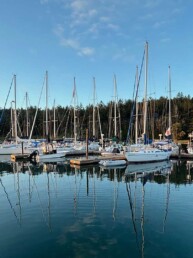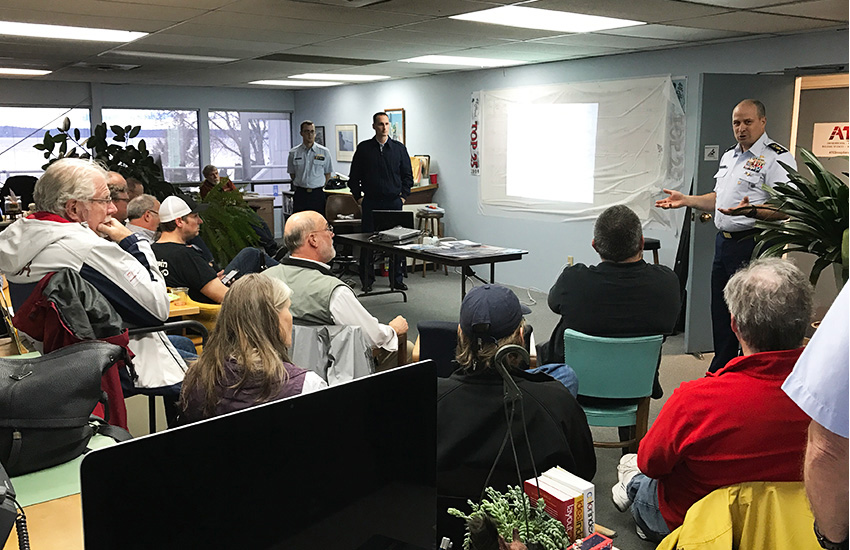
Earlier this week, twelve dedicated volunteers from area yacht clubs and sailing programs fought traffic for the unique and valuable chance to interface with five representatives of the United States Coast Guard and one representative of the Coast Guard Auxiliary.
The purpose of this annual meeting is to connect event planners and race committees with professionals from the USCG departments with which they have the most contact. The topics covered were primarily in three realms: marine event permits, VTS, and education for Uninspected Passenger Vessels (commonly known the six-pack).
Although this subject matter might seem dry, I’d describe the conversation as lively, and the useful information plentiful. Here are a few of the important takeaways:
Marine Event Permits:
- The stated USCG policy is for permit applications to be submitted 135 days prior to the event. Candidly, there is precedent for shorter lead time, but as a rule more time and more information is better. The Coast Guard representatives also noted that annually recurring events are usually processed more quickly, because the Coast Guard has considered those events in years past.
- A club or event may streamline their permit application process by including the Whale Safety and Protection rules and regulations in the sailing instructions.
- Even if the event has been deemed as a “no permit required” event in years past, you should still apply for a permit every year to alert the Coast Guard that the event is happeneing and the type and number of vessels involved.
- Click here to apply for a permit online. If you would like to communicate with the permitting folks at the Waterways Management Division, their email is SectorPugetSoundWWM@uscg.mil and their phone is (206) 217-6051.
VTS:
- VTS Trainer, Mike Bove, estimates that the VTS team helps prevent at least 50 fatal collisions each year in our region.
- VTS monitors VHF channels 5A and 14 in Puget Sound, but they will also respond to a phone call to (206) 217-6150. VTS does not monitor channel 16.
- VTS won’t tell you where to go, but they might advise you where not to go.
- VTS would really like to encourage the installation and us of AIS-B on recreational vessels, as it makes it much easier for them to identify and communicate with pleasure boats that may be having an effect on commercial traffic in VTS lanes.
- An interesting realization took place between VTS and the Waterway Management Permit divisions, when VTS learned that permits were no longer issued with a number, but rather with a name. The two are resolving this now.
Six-Pack
- The Coast Guard will offer free checks of, and education about, Uninspected Passenger Vessels (UPV)
- Boat owners or programs for whom money changes hands for access or shared usage should familiarize themselves with the USCG Requirements for Uninspected Passenger Vessels and the Guidance on the Passenger Vessel Safety Act of 1993
- The contact for this group is secseadispatch@uscg.mil and (206) 217-6208.
Coast Guard Auxiliary
- It is possible that a USCG or a Coast Guard Auxiliary vessel may be available for perimeter patrols of certain events, whether permitted or not. A Coast Guard Auxiliary boat will be a privately owned recreational vessel, but will still operate in this capacity.
Joe Cline is the Editor of 48° North.
Joe Cline
Joe Cline has been the Managing Editor of 48° North since 2014. From his career to his volunteer leadership in the marine industry, from racing sailboats large and small to his discovery of Pacific Northwest cruising —Joe is as sail-smitten as they come. Joe and his wife, Kaylin, have welcomed a couple of beautiful kiddos in the last few years, and he is enjoying fatherhood while still finding time to make a little music and even occasionally go sailing.


